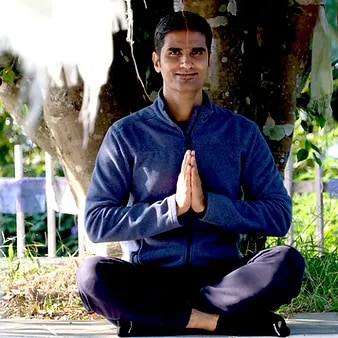Vijnanamaya Kosha: The Wisdom Body and the Path to Self-Realization
by Hardik Mehta

The ancient yogic tradition describes human existence as comprising five layers, known as the Pancha Koshas. These layers range from the physical body to the deepest spiritual essence. The fourth layer, Vijnanamaya Kosha, is often referred to as the wisdom body. It is the sheath responsible for intellect, intuition, and discernment, allowing us to differentiate between truth and illusion, right and wrong, and guiding us toward self-awareness.
In this blog, we will explore the Vijnanamaya Kosha in depth, its significance, how to balance it, and how it influences our overall well-being and spiritual progress.
What is Vijnanamaya Kosha?
The term Vijnanamaya Kosha comes from Sanskrit:
- Vijnana: Wisdom, intellect, or higher knowledge.
- Maya: Composed of or made up of.
- Kosha: Sheath or layer.
Thus, Vijnanamaya Kosha is the sheath of wisdom and knowledge. It governs our ability to process experiences, make decisions, and develop deeper self-awareness. It is the seat of our intellect (buddhi) and intuition, which helps us transcend basic sensory experiences and understand life on a profound level.
Importance of Vijnanamaya Kosha
The Vijnanamaya Kosha plays a crucial role in shaping our perceptions and guiding our actions. It is responsible for:
- Intellectual Growth: Enhancing learning, reasoning, and decision-making.
- Self-Awareness: Encouraging introspection and self-inquiry.
- Intuition and Wisdom: Strengthening our inner voice and connection to higher knowledge.
- Ethical and Moral Clarity: Helping us distinguish between right and wrong.
- Spiritual Development: Serving as a bridge between the mental and bliss bodies (Manomaya Kosha and Anandamaya Kosha).
Signs of an Imbalanced Vijnanamaya Kosha
An imbalance in the Vijnanamaya Kosha can manifest as:
- Confusion and Indecisiveness: Difficulty in making decisions or understanding situations clearly.
- Lack of Self-Reflection: An inability to evaluate one’s thoughts, emotions, and actions.
- Over-attachment to Ego: Operating purely from a place of self-interest rather than wisdom and compassion.
- Rigid Thinking: Resistance to new ideas, experiences, or perspectives.
- Disconnection from Intuition: Ignoring gut feelings and inner wisdom.
How to Balance Vijnanamaya Kosha
Balancing the Vijnanamaya Kosha involves engaging in activities that sharpen intellect, enhance self-awareness, and foster wisdom. Here are some effective practices:
- Jnana Yoga (Path of Knowledge)
Jnana Yoga is the direct practice of self-inquiry and wisdom. This involves:
- Study of Sacred Texts: Reading scriptures such as the Bhagavad Gita, Upanishads, and Vedantic literature.
- Contemplation and Reflection: Engaging in deep thought about existential questions.
- Self-Inquiry (Vichara): Asking oneself, Who am I? to explore the deeper self.
- Meditation and Mindfulness
Meditation practices that cultivate wisdom include:
- Vipassana (Insight Meditation): Observing thoughts and sensations to develop clarity.
- Chakra Meditation: Focusing on the third eye (Ajna Chakra), which is linked to intuition and wisdom.
- Guided Visualization: Imagining situations that require ethical decision-making and wisdom.
- Yogic Practices to Enhance Intellectual Clarity
Certain yoga poses help activate the mind and strengthen intellectual faculties:
- Padmasana (Lotus Pose): Encourages deep meditation and insight.
- Balasana (Child’s Pose): Aids in introspection and calming the mind.
- Vrikshasana (Tree Pose): Enhances focus and mental balance.
- Developing Critical Thinking and Emotional Intelligence
To strengthen Vijnanamaya Kosha, one must cultivate rational thought and emotional awareness:
- Practice Logical Reasoning: Engaging in analytical thinking and problem-solving.
- Read and Learn Continuously: Expanding knowledge through books, discussions, and courses.
- Observe and Reflect: Taking time to analyze personal behaviours and motivations.
- Karma Yoga (Path of Selfless Action)
Performing actions without attachment to results fosters wisdom and self-awareness. This includes:
- Volunteering and Service: Engaging in selfless work for the benefit of others.
- Detachment from Ego: Acting without expecting rewards or recognition.
- Living with Integrity: Making ethical decisions based on wisdom and fairness.
The Role of Vijnanamaya Kosha in Spiritual Growth
A well-developed Vijnanamaya Kosha leads to deeper self-realization. It acts as the guiding force that helps one move from intellectual knowledge to experiential wisdom. It allows individuals to:
- Gain a clear perception of life’s purpose.
- Transcend beyond personal desires and attachments.
- Connect with the Anandamaya Kosha (bliss body), leading to ultimate spiritual fulfilment.
The Vijnanamaya Kosha is an essential layer of human consciousness that governs intellect, intuition, and wisdom. By engaging in self-inquiry, meditation, yoga, and continuous learning, we can strengthen this sheath and align ourselves with our true purpose.
If you’re looking to deepen your understanding of the Pancha Koshas, Sayujya Yoga’s 200-hour TTC program offers structured training that explores each layer, including Vijnanamaya Kosha, fostering intellectual and spiritual growth. Developing this kosha allows one to navigate life with greater clarity, purpose, and inner peace.
About the Author

Hardik Mehta
Hardik is an E-RYT 500 & YACEP (Yoga Alliance Continuing Education Provider), Yoga Alliance, USA. He has been practicing yoga for the last 9 years. Prior to finding his true calling in Yoga, he was working with various corporates for 12 years in the Retail and eCommerce sector.
